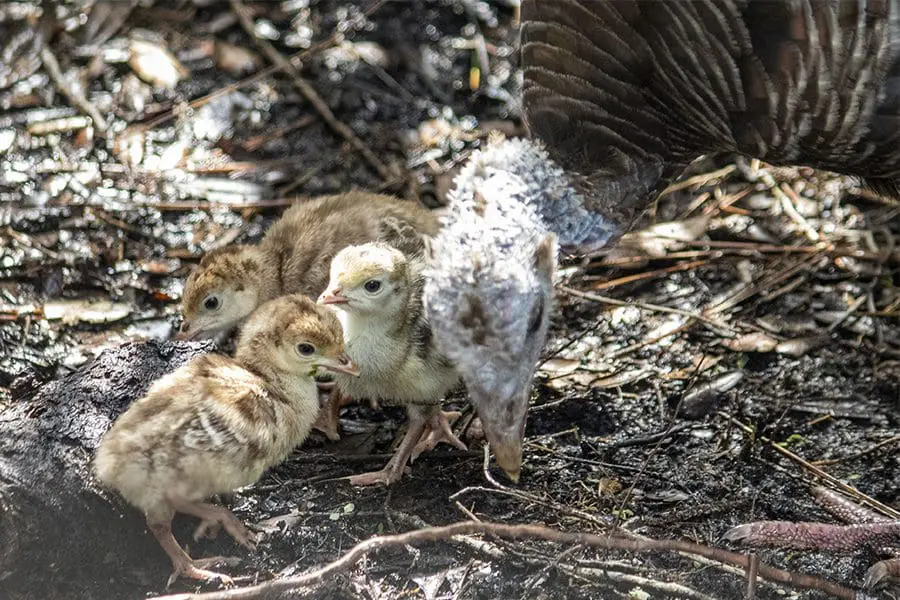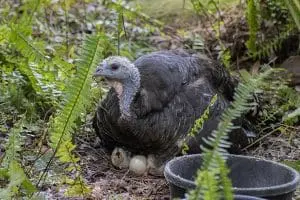

Our three turkey chicks can be found close to mom, Giblet!
Thanksgiving may be two months away, but our Osceola turkey flock is celebrating a little early. Three chicks were hatched to mom Giblet and dad Green Bean Casserole (yes, that’s his full name!) on September 9 and 10.
 These tiny fluffballs are the first turkey chicks to hatch at the Zoo. Our small flock of turkeys has lived with us since September 2020, and although our females had laid eggs in the past, they had not produced any chicks until now. Our tom (male) turkey, Green Bean Casserole, lives with hens (females) Giblet, Gravy and Cranberry.
These tiny fluffballs are the first turkey chicks to hatch at the Zoo. Our small flock of turkeys has lived with us since September 2020, and although our females had laid eggs in the past, they had not produced any chicks until now. Our tom (male) turkey, Green Bean Casserole, lives with hens (females) Giblet, Gravy and Cranberry.
Our food-named flock had previously lived in a habitat near the Wild Florida entrance with white-tailed deer Persimmon and Baird’s tapir Josie. Over the past few months, our animal care team has made some changes to our animals’ habitats, including renovating the large area by Florida black bears to house our turkeys, Persimmon and four-month-old deer fawn Plum.
While we cannot say for sure that moving to the new space is the reason why breeding has been successful, it could certainly be the case. Green Bean Casserole may have also become more interested in his fellow female turkey.
Regardless of the reason, we were thrilled when our animal care team noticed that Giblet had laid a total of 11 eggs in mid-August. This being her first time laying a viable nest, we were unsure of how many chicks would hatch. On Friday, September 9, two fluffy turkey chicks emerged from their eggs, and another made its way out the next day.

“Giblet is an amazing first-time mom and is very protective of her offspring,” said Marc Franzen, Wild Florida’s Area Supervisor. “The chicks are all doing well and are staying close to mom but moving around more every day.”
Giblet and her three younglings are currently spending their days in their habitat in Wild Florida, and their nights inside a night house. “This reduces the threat of predation while keepers are not able to monitor the group,” said Marc. On Wednesday, Giblet and the chicks were given access to the entirety of their habitat so they can interact with the other turkeys and deer Persimmon and Plum.
We’re hoping that there is potential for more turkey chicks in the future – and it may happen sooner than you’d think. Cranberry is sitting on a nest of her own! Our animal care team has spotted eight eggs in her nest and will candle them soon to assess their viability. Once laid, turkey eggs incubate for approximately 28 days from the time the last egg of the clutch has been laid.
The turkey chicks are currently being offered a starter diet that is high in protein, worms and lettuce.
On your next visit to the Zoo, swing by the Wild Florida loop to see if you can spot our tiny flock of turkey chicks! If you can’t see them, you may be able to hear them chirping.
Brevard Zoo is an independent, not-for-profit organization that receives no recurring government funding for our operating costs. Your generous support enables us to continue to serve our community and continue our vital animal wellness, education and conservation programs.